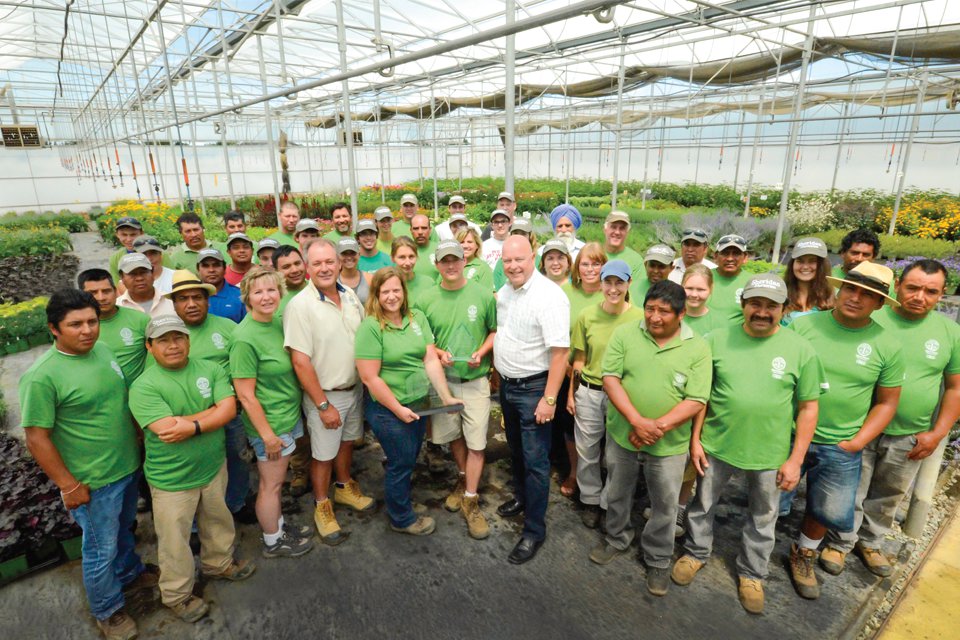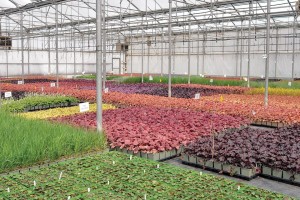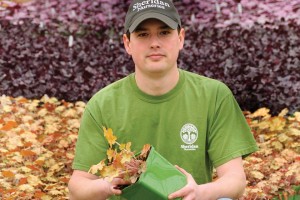Greenhouse Grower’s 2015 Operation Of The Year Sheridan Nurseries Raises The Bar

Sheridan Nurseries CEO Karl Stensson (center) presents the growing team at the operation’s Norval, Ontario facility with its Grower of the Year awards
Ontario-based Sheridan Nurseries has long been an innovator in the Canadian market, but during the economic downturn, CEO Karl Stensson says the company decided to take things a step further.
“We have survived the Great Depression, two World Wars and many other downturns in the economy,” he says. “During this last recession, our staff set out at being the best at what we do.”
The company’s efforts have paid off. Sheridan Nurseries was named Operation of the Year at Greenhouse Grower’s Evening of Excellence, held July 13, at Cultivate’15 in Columbus, Ohio. The company was also awarded for Excellence In Perennials Production, based on its reputation for plant quality and the activities the nursery has led and been a part of, both within its company and in the industry at large.
“We are elated and proud of our staff accomplishments,” says CEO Karl Stensson. “Over the last five years, we have been on a mission to be the best grower and the cleanest grower in the country. We believe we are close to our goals and these awards motivate us to raise the bar even further.”
Representatives from the perennials growing staff, Jessie Kee, senior grower, and Daniel Fevreau, assistant grower, attended the Evening of Excellence to accept the award. Later that week, Stensson made a formal presentation of the award to the entire staff at the production facility in Norval, Ontario.
“These awards verify that our endeavors over the last five years have been worth it, Stensson says. “The awards do not in themselves give us any more business, but they do bring awareness to our products and services, and it is up to us to prove that this is what we do every day, not just to win an award.”
Brenda Luckhardt, business to business marketing and development manager, says there was an exciting energy at the operation when the award was presented.
“Everybody that works for a company contributes to the success of the company. It’s not just the head grower, it’s not just the marketing — it’s right down to everybody that works in the operation,” Luckhardt says. “When you see the caliber of the competition and the companies that you’re up against, it really makes you feel proud that you can be up there with these big growers and beautiful operations.”
More Than 100 Years Of Experience
Sheridan Nurseries is Canada’s largest grower of hardy nursery plants and has been in business for more than a century, having opened in 1913.
The operation has two production facilities with a combined 900 acres, plus eight retail garden centers. Its Norval, Ontario, facility includes 83 acres and 340,000 square feet of heated production space. There, Sheridan grows annuals, perennials and vines and propagates its own nursery stock liners. Woody plants, including trees, shrubs, evergreens and broadleaf evergreens, are produced at its Glen Williams, Ontario, container and field nursery, which has more than 162 acres in container production.
Sheridan Nurseries’ customers include independent garden centers, landscape professionals, government and mass merchants throughout northeastern North America, from Minnesota to Newfoundland.
In 1998, Sheridan Nurseries was recognized as being one of Canada’s 50 Best Managed Private Companies.
And since embarking on its mission to be the best, Sheridan Nurseries was awarded the Nursery Grower of the Year in 2012 and 2013 by the Canadian Nursery and Landscape Association and the AIPH International Grower of the Year for an unprecedented two times. Also, two of Sheridan’s garden centers were awarded Garden Center of the Year in Canada.

At its Norval, Ontario, facility, Sheridan Nurseries grows annuals, perennials and vines and propagates nursery stock liners
Innovation In Perennials Production
As part of its effort to raise the bar, Sheridan Nurseries has developed various new perennials products in recent years.
“There’s many things we’ve been able to do over the last few years. We’re really excited about some of the new product developments,” says John McLaren, head perennial grower.
The operation has put a focus on providing color, says McLaren, and has produced its color pot program, where a mix of perennials in full bloom are sold in coordinating colored pots.
The operation is also creating mixed containers with annuals and perennials in the same basket. Also, the Bee-nificial Garden collection was added this year to the Sheridan Garden Classics, a collection of perennials. The new addition includes a mix of pollinator-friendly plants, which, McClaren says, were well received in the market.
Sheridan Nurseries has also made developments in the areas of technology and infrastructure.
“Our industry is changing, and to keep up with that change, you need to be on the forefront of technology and industry leading initiatives,” Stensson says. “Our senior leaders are accountable for their successes and are empowered to make decisions to improve our business practices and grow our business.”
Remote GPS sensor technology throughout the greenhouse and nursery areas monitor pH, soil, temperature and moisture via sensor transmission using a Wi-Fi connection. The technology allows staff to get real-time information through their computers or smartphones.
One environmental initiative is the expansion of water-holding capacity in the Norval facility. Rainfall off of the gutters of the greenhouses is collected and stored in rainwater harvesting cisterns.
“We’re quite proud of some of our environmental initiatives,” McLaren says. “I think this award has kind of given us some recognition and let us know that we’re on the right path.”
Taking Advantage Of Vertical Integration
Because Sheridan Nurseries is vertically integrated from propagation to retail, the operation can complete trials on new products and packaging formats. Over the past 100 years, Sheridan has introduced more than 30 new cultivars into the marketplace.
McClaren says that being growers involved in the retail business “allows us to react quickly to the changing marketplace and changes in everyday life. We’re able to see it right from the beginning to the end, and meet the changing needs from the consumers, as well.”
Luckhardt says it’s like having their own focus group, and it allows them to be more in touch with what retail consumers are looking for.
“If we come up with an idea of something new we want to try we’re able to propagate it, get it started at a greenhouse, move it through and actually market it to a consumer before we actually say to our independent garden centers, ‘Hey, try this it really works.’”
Being vertically integrated allows for efficient communication, as well.
“We’re constantly in communication with each department, so it’s a very quick process,” McClaren says.
One example of this is the weekly selection of the most retail-ready products.
“Every week, the growers select products they feel are prime, or looking really good, we call it our ‘simply the best,’ and then it’s communicated out very quickly to our customers and our garden centers so they can select the product early enough to get it to their benches when it’s prime,” Luckhardt says.
The program runs weekly from April to October. A lot of time is spent each week selecting the right product, but the result is plants that look great when they arrive in the garden center.
“There are definitely processes in this company that have been done the same way for decades because they work,” says Mary Jane Ash, Norval propagation manager. “Our company’s known specifically for the number of years of experience in its staff members. We have at least two people who have more than 50 years with the company, and several others who have been here 35 to 40 years. People stay here for the long haul.”

John McClaren is the head perennial grower for Sheridan Nurseries
Sheridan Nurseries Is Active In The Industry
Sheridan Nurseries has always been involved in industry organizations, and is a founding member of Canadian Society of Landscape Architects, Canadian Nursery Landscape Association and Landscape Ontario. It also sponsors the Dunington Grubb Award for outstanding landscape installation by Landscape Ontario members.
When boxwood blight was introduced to the industry, Sheridan took the lead working in conjunction with the University of Guelph pest diagnostic department and the Canadian Food Inspection Agency (CFIA).
“A couple of years ago when the blight entered North America, it got everyone pretty upset,” Ash says. “It started spreading pretty quickly, and so we got together with our government regulatory body and with our local university, to write a protocol and find out more information about the disease, as well, because not much was known at this time.”
Once written, the protocol was shared with industry associations and growers.
“We have had (CFIA) do some testing on site, and we do our own testing through a third party diagnostic clinic nearby, so we know that our stock is definitely clean,” Ash says. “So we’ve put into place other measures to make sure that we keep it out. We can guarantee our stock is clean. We don’t actually allow any external boxwood into our nursery at all.”
Two masters students worked on the project with the help of Sheridan Nurseries, which made monetary and plant donations to the cause, according to Ash. The effort led to the discovery that the fungus carries over in soil, even through the winter.
“There have been a few things found out, especially for this growing region, from the research that was done locally,” Ash says. “So that can be offered up to the global research regarding the disease and help forward the management plan.”
Sheridan Nurseries continues to work with Vineland Research Station and the University of Guelph’s horticulture department to test plant growth utilizing optimal fertilizer rates to reduce, and eventually eliminate, the use of peat moss in growing media.
“That’s an ongoing program right now and it’s being headed up by our container operation,” Luckhardt says. “We use recycled composted plant material in our mixes, and we’re trying to use less and less peat moss in the mixes, because peat moss isn’t a renewable resource.”
Luckhardt says it is worthwhile for Sheridan Nurseries to make efforts that improve the industry as a whole.
“Our industry is respected by the community,” “When the industry is strong, and we share our information and that the industry is moving in the right direction, the public feels good about what we do as an industry. We like to make sure that horticulture and the nursery industry is respected by the consumers as not contributing to any of the problems or issues, and is actually helping and finding solutions and being forward-thinking on the solutions.”
Ash says that throughout the company, trials and experiments are always being conducted to see how things can be made better.
“I guess you can say we’re a forward-thinking operation in general,” she says. “We’re very progressive in that way.”
According to Luckhardt, employees throughout the entire company take part in coming up with environmentally sustainable ways of doing things.
“Not even just our growing departments, but our offices and everywhere, environmental concerns are front of mind,” Luckhardt says.
Each staffing area has an individual tasked with coming up with ways their department can save on resources. If an idea is accepted and implemented in one department, it goes across the departments, Luckhardt says.
Sheridan Nurseries also makes it a priority to donate to causes throughout greater Toronto, especially those with a focus on children in need, such as Children’s Wish Foundation and Upopolis. It also hosts a program called Little Diggers, which inspires children to engage in horticulture, and sponsors school-greening activities through its Growing Up Green fundraiser. Sheridan also partners with Princess Margaret ‘Plants for a Cure’ program, in which a contribution from each plant sold in the program is donated directly to the Princess Margaret hospital.









